- Home
- P. L. Gaus
English Shade Page 3
English Shade Read online
Page 3
“Yes,” Branden said, nodding. “That’s me.”
Ivan Coblentz thrust his hand forward again, took up Branden’s, and shook his hand firmly. “My daughter ran in that crowd with Johnny Schlabaugh’s gang, Professor. You saved the whole lot of them that one summer. And Jeremiah is telling us all the time how you rescued him before, when he was just a lad. That awful summer when his father was killed, trying to bring him home.”
“Yes,” Branden replied. “That was us. Caroline and me. And the sheriff.”
“And Pastor Troyer, too,” Coblentz said, stroking his long chin whiskers. “You must be here to see Jeremiah. He’s back in the shop.”
“We’d like to talk to him,” Branden said, “to catch up a little. And to see where he works, now.”
“Yes, of course,” Ivan said, “but while you’re here, you could look at some of our work? You might need a desk? Or bookshelves? It wouldn’t hurt to look.”
The professor smiled and nodded. “We’ll be sure to do that.”
“Just a minute, then,” Coblentz said. “I’ll have them stop the saws, so you can visit. While you shop.”
Chapter 6
Friday, June 5
2:00 PM
Covered in sawdust, just as his boss Ivan had been, Jeremiah Miller came out to the Brandens bashfully, gently shaking each of their hands in the sound-proofed outer office. They spent several minutes there, reminiscing, sometimes pleasantly and sometimes sadly, and asking questions about their lives.
Yes, Professor Branden was still teaching. No, Caroline was not working. Yes, there had been quite a stir in Millersburg, during the recent construction of the professor’s new museum buildings, and then even more of a stir when the museum’s collection of battlefield firearms – most from the American Civil War – had been transferred from Millersburg College to the new and modern, glass and steel facility beside SR 83, north of the village, next to the old County Home.
Jeremiah seemed especially curious about the firearms, and at one point he remarked that he had a particularly fine .22 rimfire rifle, for hunting squirrels and rabbits. “It’s a Ruger,” he said, “with a synthetic stock.”
“The model 10-22?” Branden asked.
“Yes.”
“Then that’s the good one.”
The professor next inquired about Jeremiah’s wife Sara, and Jeremiah explained that she still struggled with her speech impediments, but that the rest of the family had all pretty much gotten used to them. They really didn’t notice it so much anymore. Sara and Jeremiah had nine children, some already beyond their school years. Their oldest, Jacob, was courting a Hershberger lass from the Andy Yoders. And since the Andy Yoders were a congregation in central Ashland County, thirty miles to the north, Jacob often traveled there on one day and then stayed several days and nights with Bishop Yoder’s neighbors, before driving his buggy home. A wedding was expected in November, after the harvests.
Then Jeremiah took the Brandens on a tour through the woodshop. Inside, against each of the exterior walls of the woodshop, the wood stock was propped in groups, each species of wood being kept together. These were large 2x8 boards, some ten or twelve feet long. There was black walnut, cherry, maple, red and white oak, spruce, cedar and locust. The professor recognized most of these from his childhood days, watching his grandfather work in his own shop behind their garage.
But in a corner, there was a creamy-gray wood, lacking any distinctive grain, that the professor did not recognize.
He asked about it, and Jeremiah smiled. “It’s banak, professor. We get it from Belize.”
The professor raised a brow.
Jeremiah nodded. “It’s lighter than walnut or oak, and it’s easier to mill. It’s strong, too, so we can use it for the interior frames in desks and dressers.”
“From Belize,” Caroline commented.
“Interesting, isn’t it,” Jeremiah said. “If we know anything here, we know fine wood.”
Then Jeremiah walked them around the shop, pointing out and naming each of the machines. There were tabletop saws and radial saws. Some of the saws were set up for ripping and some for cross-cutting. There were bandsaws and jigsaws. Routers of various configurations, and edgers. Planers, sanders and jointers. And several sizes of drill presses.
At each of the machines, the professor recognized the aromas of the woods that had last been run through the blades. There was nutty walnut, fruity cherry, aromatic cedar and pungent spruce.
At each machine, the men had affixed a run of dryer exhaust hose that would carry the majority of the sawdust produced there, out to a tall hopper beside the exterior of the building.
“We sell the sawdust,” Jeremiah explained. “They use it to make those compressed Eco Brics for wood stoves. So, come winter, it all gets burned for heat.”
Outside, Jeremiah guided them to a picnic table beside the long, wispy branches of an old willow tree. The dangling branches over the picnic table had been trimmed up, so that carpenters could sit there beneath them, for lunch in decent weather. The willow branches on the other side of the tree fell into the trickling waters of Rupp’s Run, and the narrow leaves of the branches were given a lazy, peaceful dance by the current.
“We’re proud of you, Jeremiah,” Caroline said, once they had taken seats at the picnic table. “You’ve done well.”
Jeremiah chuckled a bit. “Got a rocky start.”
“Do you like working here?” the professor asked. “Is it still as good a shop as it used to be?”
Jeremiah nodded happily. “It’s probably better than it used to be. Ivan used to run old-fashioned machines on air compressors. Now, everything is done with electricity, and the machines are all new and modern. It’s better, and it’s safer. He’s making more money, now, and he can afford the best equipment.”
“Ivan always used to make the very finest items,” the professor said.
“He still does,” Jeremiah said. “We still do. If it weren’t perfect, I wouldn’t sign my name to any of it.”
Chapter 7
Friday, June 5
2:10 PM
In her pleated forest-green dress, with a white apron and black bonnet, Rose Linder stood at one of the tall front windows in her Amish furniture store in Charm, Ohio, watching the tourists across the street, as they scrimmaged in their cars for parking spaces at the boot and harness store on the rise north of the road. South of the road, on lower ground, her store sat close to the edge of State Route 557, and consequently there were only four parking spaces available in front. Usually these were occupied by tourists’ cars, as were the dozen spaces in back. But for some reason, she had no customers at the moment.
So, enjoy this peacefulness, she told herself. Straighten your apron properly, and adjust your bonnet. Stand in this quiet moment, and let your prayers ascend.
But in that same moment of thought, almost with the very start of a prayer, her worldly concerns flooded over her instinct to pray. Sales were down this month. Oh, sure, there had been customers aplenty, but they had all too often been just browsers. Too few of them had made purchases, and Rose was fretting again about the ledgers. Sales down. Income down. Savings down.
And Rollie Kent hadn’t called last night. He was supposed to have stopped in Chattanooga. He always called at night from his hotel, to reassure her about her deliveries. This afternoon, he was supposed to be pulling his truck up behind Richard and Rita Barrow’s store in Nokomis. But Rollie hadn’t called last night. Was there a problem? Was the shipment safe? ‘More worries,’ Rose whispered. Always so many worries. Nervously, she chided herself – ‘relax.’
She closed her eyes and tried again to pray. All she got was the worries.
Eyes still closed, she began to whisper, ‘Lord, please . . .’ but more worries crowded around her. Her instincts for pessimism pushed her prayerfulness into the background of her thoughts, and she held her eyes closed to fret over the possibilities for failure.
When she opened her eyes, her insti
ncts were fortified. Bishop Small Henry Rupp was parking his buggy cross-wise over three of Rose’s best front parking spaces. Inside the store, she sighed and whispered, ‘What now?’
- - - - - - - - - - - - - - - - - -
Small Henry hobbled his horse and carried a pale of water from the cargo bay at the back of his buggy, to place it under the nose of his chestnut mare. She was a pacer, from the county racetrack in Delaware, Ohio, and he had favored her for nearly twelve years. He stroked his fingers along her mane, and he gave several substantial pats to her withers. Then he turned his sight and his full attention to the front of Linder’s Amish Furniture store.
The store entrance was through a heavy wooden door between the two front picture windows. He climbed three concrete steps, pushed the door open and entered.
Inside, the displays to his left and right featured dining room sets, positioned for display at the front windows. He turned to the walnut set on the right.
There Rose Linder greeted Small with a smile that seemed tentative to him.
“Bishop,” she addressed him respectfully. “I’ll get Amos.”
Small nodded with his usual reserved demeanor, and he turned toward the front of the store as she headed to the back. This aloof display of disinterest was his usual practice while alone with a woman of the congregation. Especially with the handsome ones.
It was proper behavior, he knew, and his congregation expected it of him. But he also knew that they would all remember how he had courted Rose when they were younger, before Amos Linder had won her heart. Remembering, Small sighed. In his eyes, she was still a handsome woman, even after all the years.
Amos Linder came forward, then, and said, “Small, you’ve caught us in a lull. Is there a problem?”
Small turned around to him, offered his hand and said, “Amos. No. I just want to talk.”
“Coffee?”
Small nodded, and Amos led to the back of the store. Rose was standing beside the maple credenza, and her coffee pot there was already chattering.
“I just started it,” Rose said. “It’ll be fresh.”
She gave a white ceramic mug to Small, and a matching one to her husband, and she stepped aside to let them take seats at a round kitchenette table. Small and Amos sat in two of the four chairs, opposing each other, and Rose waited to Small’s right, beside the coffee pot.
The two large Amish men could have been brothers. They were dressed the same, in gray denim suits, black vests and long-sleeved blue silk blouses. Their Dutch-style hair covered their ears. Their cheek and chin whiskers fell long, nearly reaching their bellies, and their large, calloused hands rested peacefully below the whiskers, in their laps. Amos knew that their conversation would be quiet and respectful, devoid of any needless jocularity, and they would focus seriously and maturely on whatever topic the bishop had brought with him that day. This was the respect due a bishop.
Amos also wondered what that topic would be. He passed a glance to his wife, standing beside the credenza, and she just shrugged her shoulders.
Was someone in the ER, Amos wondered, and this was a call for cash? Was the congregation ready to buy more land? Or was there perhaps a van to rent and a driver to be hired, for a wedding in a distant state? Amos knew it could well be something like this.
Amos also knew that Small would circle rather obliquely around his point, avoiding a direct question. Avoiding, perhaps, even a tangential question, if he could infer from their talk together whatever it was that he wanted to know. So cautiously, as the coffee brewed, Amos waited for the bishop to speak.
“Sit with us, Rose,” Small offered, turning his head to look over at her, and Rose answered, “Let me pour, first, Bishop.”
Small nodded and turned back to face Amos on the other side of the table. “Slow, today?” he asked, and Amos said, “Lately, it has been.”
“Something that you’re worried about?”
“Not really,” Amos said, catching his wife’s eye. “The store in Florida always fills in the gaps. When it’s slow here, they seem to pick up the pace down there.”
“Are you still sending your deliveries down on Thursdays?” Small asked. He held up his mug so that Rose could pour, and tipping his eyes briefly up to her, he said, “Sit with us, Rose.”
Rose poured coffee for her husband and for the bishop. She set the carafe back on its plate, and she sat between Amos and Small. She scooted her chair closer to her husband, and she turned it slightly to face the bishop more squarely.
“So, you’re not worried about the business?” Small asked again.
“Not at all,” Amos said.
Small nodded and put a bit of a smile forward. “Is Rolland Kent still your truck driver?”
Again, it was Amos who answered. “Rollie, yes. Rollie Kent.”
“I guess you still trust him,” Small said, using his tone to make it more of a comment than a question.
Amos answered with only a nod.
Small held silence, considering, and then he said, “I guess every man deserves a chance at redemption.”
“Small, really,” Amos began, catching a sideways glance from Rose. “That was a long time ago.”
“Yes,” the bishop agreed. “I suppose it was.”
Now, it was Amos who took the opportunity to hold silence.
With a mildly sardonic smile, Small said eventually, “No matter, now. No matter.”
“More coffee?” Rose asked the bishop.
Small glanced into his mug and realized that he hadn’t sipped any of the brew.
“Is it cold?” Rose enquired.
Small sipped at it. “A little.”
Rose reached across the table, took the bishop’s mug, and carried it to the microwave oven. She set it inside, punched at buttons, waited for the bell, and set the hot coffee back in front of the bishop.
As she was reclaiming her seat next to her husband, Bishop Rupp asked wistfully, “Is the electric everywhere, now?”
Rose scooted her chair closer to her husband, and she laughed briefly, nervously.
“It makes this all possible,” Amos said, sweeping his arms to indicate the whole of the store. Inwardly, he was alarmed. First our cell phones? Now electricity, too?
“I’m not so sure,” the bishop said softly. “I’m really not sure anymore, what exactly the electric does make possible.”
“It’s good for everyone,” Amos pressed forward reflexively. “We bring more money to the church than any other family.”
- - - - - - - - - - - - - - - - - -
Small Henry tapped several impatient times with the light tassels of his whip, prodding the rump of his chestnut mare. He was impatient to be home, and he had been grumbling wordlessly, all along County Road 19, heading west, back to his home beside the Doughty Creek, a half-mile beyond the small Amish village of Becks Mills. He pulled into the graveled drive at his house, and he sat quietly on the plank seat of the black buggy. Eventually, he began to speak again to his cousin Big Henry Rupp.
Did you spot it, Big? I’m sure you did. OK sure, the electric is a problem. That will be a hard nut to crack. They’re dependent, now, on the English. They’ve lost their autonomy. They act like they cannot prosper without the electric wires. Like they cannot prosper without the English yoke. They are too comfortable with the idea of it. We were never supposed to live this way. That’s a troublesome problem to be sure, Big, but that’s not the whole of it. Yes OK, here is greed at its evil beginnings. I can see that, just as you can. But there is something so much worse, here. How did Amos say it? We bring more money to the church than any other family. And there it is, Big. Right there is the heart of it. The dreadful sinfulness of pride.
Chapter 8
Friday, June 5
5:20 PM
It was late in the afternoon when Rollie Kent finally called Rose Linder from the Barrow’s furniture store in Nokomis.
Seeing the number on her cell phone, Rose answered with a curt, “Rolland?”
“Sorry
, Rose,” Rollie said. “I hit fog in the mountains south of Knoxville. Didn’t get to Chattanooga until late last night.”
Still sounding perturbed, Rose asked, “Why didn’t you just call from the road?”
“The battery ran down on my cell phone, and I didn’t notice until I got to my hotel. Then it was too late to call.”
“Is my shipment safe, Rollie? All of it?”
“Yes. Of course. We’re unloading it now.”
“Listen, Rollie, I really do rely on your phone call. You know I worry.”
“You shouldn’t, Rose. I’ve been making these runs for years, now.”
“OK. Right. OK. Now, is Barrow going to accept all of our pieces this time?”
“Of course. He really doesn’t bother to check them, anymore. He’ll be needing more by the middle of the month. He’s nervous. Wants more product.”
“So, he hasn’t noticed anything? He’s still satisfied with the quality?”
“Of course, he is. He’s not paying that much attention to it.”
“Well, sales are off a bit, up here,” Rose said. “I’m the one who should be worried.”
“You needn’t worry, Rose. The Barrows will be able to sell anything they can get from us.”
“It takes time, the way Ivan works. You know that, Rollie. They’re getting it as fast as he makes it. So, tell them to relax. It’s our sales here in Ohio that are falling off.”
“Can Coblentz expand his shop?” Rollie asked. “Can he figure something? Like hire more carpenters?”
“I’ll ask him,” Rose said. “You be safe coming home. Through Raleigh/Durham again?”
“Of course. As usual.”
- - - - - - - - - - - - - - - - - -
While Rose had been talking on the phone at the back of Linder’s store, Amos had been locking up at the front door. He had also been posting new signs in the two front windows, announcing a week-long anniversary sale of ten percent off anything over a thousand dollars. As he walked back to Rose in the office, he was muttering.

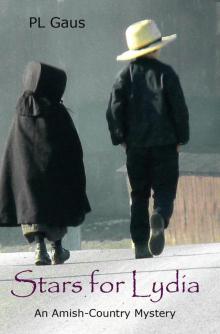 Stars for Lydia
Stars for Lydia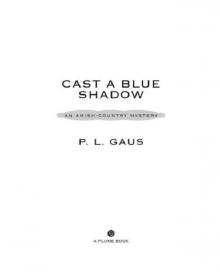 Cast a Blue Shadow
Cast a Blue Shadow Separate from the World
Separate from the World Clouds without Rain
Clouds without Rain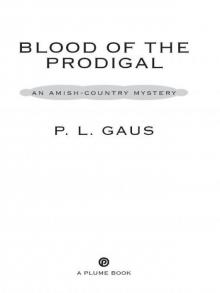 Blood of the Prodigal
Blood of the Prodigal Whiskers of the Lion
Whiskers of the Lion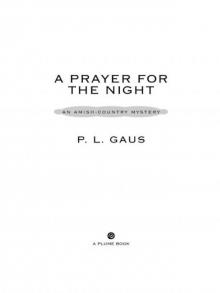 A Prayer for the Night
A Prayer for the Night Broken English
Broken English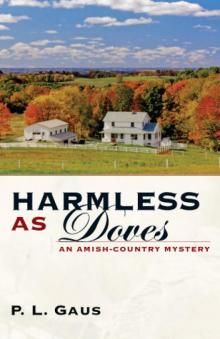 Harmless as Doves: An Amish-Country Mystery
Harmless as Doves: An Amish-Country Mystery